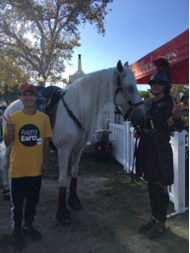My name is Colin Stillman, and I am a Class of 2026 undergraduate studying Economics and Environmental Studies! This week is especially important, since it is time for one of USC’s largest events—Green Week!
USC is well known for its academic programs and vibrant on-campus life, but it is also a major player in sustainability. The university has a plethora of opportunities for students interested in the sustainability field—and it also engages with surrounding communities and organizations. This is all a part of USC’s 2028 Sustainability Framework (a.k.a. Assignment: Earth) which seeks to educate students, conduct research, and achieve climate neutrality. Under President Folt, this has become a major priority for the university.
One of USC's biggest environmental initiatives is the Wrigley Institute for Environment and Sustainability, a campus founded in 1965 on Catalina Island. Wrigley’s 40-acre space does groundbreaking research into ecosystems, ranging from the Garibaldi (think a giant goldfish) to glowing eels. Wrigley has large research labs, housing, and even its own dining hall. The campus isn’t just for researchers, though. If you’re interested in a Maymester or Julymester course, Wrigley has classes that give you hands-on research experience, and many student organizations take trips there each semester. I went there with my Environmental Studies cohort and the Environmental Student Assembly, but trips are offered through USC Housing and more! All you do is hop on USC’s boat in Long Beach and soon you’ll be in an isolated paradise in the heart of a Marine Conservation Area. I’ve gone snorkeling, hiked to Catalina’s tallest peaks, and taken guided boat tours around the island!
If you’d rather stay on-campus, the Sustainability Hub opened in Fall 2023 and broadened access to sustainability for students. It’s located in Student Union Room 101, or immediately to your right when entering the Student Union from Trousdale Parkway. It’s a meeting location for USC’s environmental organizations, but it also has study spaces and private Zoom rooms for students to take meetings. They also give out tons of free stuff. I’ve gotten an industrial flashlight and an umbrella for free from its item shelves, which source abandoned items from the university’s lost and found. I’ve also probably saved a hundred dollars on my laundry detergent in the past 2 years, since they give me free detergent (eco-friendly!) every time I walk in. There are all sorts of great things in the Sustainability Hub, from its life-size polar bear made of trash to its enormous murals of nature settings.
Outside of this, sustainability is a core part of USC’s master planning and the university continually makes important contributions. For example, USC placed solar panels on the roof of Galen Center in 2020, and the newest on-campus building, Ginsburg Hall, is LEED platinum—with AC that actually cools its walls and not the air, saving tons of energy. There’s also a lot of ways for students to learn about sustainability and engage with it. For example, Green Week, held each September (right now!) is one of USC’s hallmark initiatives.
Green Week is an opportunity for students to work with local organizations and learn about the environment. USC’s two gardens (the Peace Garden north of campus and the Parkside Garden) are open to students so they can plant some flowers, pick some weeds, and maybe even see some butterflies! It’s always a blast, and there’s food, music, and ways to meet new people. I’ve met some of my closest friends at these events, and they provide an opportunity to get involved with nature without leaving campus. There are also walking tours of campus nature spots and workshops led by different departments. For example, the Roski School of Art and Design teaches students how to stitch their old clothes into new ones! Finally, there are opportunities at USC-sponsored events. In my freshman year, I volunteered at an Assignment: Earth booth during a football game, where I got to ask environmental trivia to guests and hand out prizes! I was also first in line to take a picture with Traveler the horse, which was a nice benefit.
At the end of the day, sustainability isn’t the only factor that makes up the USC experience, but it’s a big part of what makes USC so well-rounded. No matter your major and interests, there’s something in the sustainability space for everyone—even if you just want free laundry detergent or to plant some carrots. Sustainability at USC is a great way to get outside, learn something new, and have tons of fun while you’re at it!
Written by: Colin Stillman, Class of 2026




